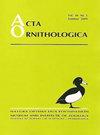Internal Architecture Differentially Affects Thermal Insulation in the Walls of Common Blackbird Turdus merula Nests
IF 1.3
4区 生物学
Q3 ORNITHOLOGY
引用次数: 0
Abstract
Abstract. Nest construction may result in niche creation by the bird, i.e., modification of the immediate environment in terms of temperature or humidity. Here thermal insulation of nests of the Common Blackbird Turdus merula was investigated using a heat source placed inside the cup. The temperature profile of the nest wall was recorded using thermistors placed at different positions in the nest wall. Temperatures were affected by the layers in the wall with the grass cup lining and mud cup offering more insulation than the outer wall. Thermal conductance of the wall of Common Blackbird nests was relatively high compared to other reports for this variable in other passerine species from Australia. Variation among Common Blackbird nests in terms of temperature differences across layers, and thermal conductance overall, correlated with the thickness of the grass cup lining. Thermal insulation provided by a nest wall is dependent on the thicknesses and types of materials used in each part of the wall. Previous studies using nest deconstruction have demonstrated that the various layers in a wall have differing thermal characteristics. This is the first report of clear differences in the temperature profile across the different parts of the intact nest wall. Whether this pattern is also observed in nests of other species requires further investigation. The placement of different materials within the nest wall by the bird is not a random process and the results support the idea that the avian nest is involved in niche creation.内部建筑对常见黑鸟Turdus merula巢穴墙壁隔热的不同影响
摘要鸟巢的建造可能会导致鸟类创造生态位,即在温度或湿度方面改变周围环境。在这里,使用放置在杯子里的热源对普通黑鸟Turdus merula巢穴的隔热进行了研究。使用放置在巢壁中不同位置的热敏电阻来记录巢壁的温度分布。温度受到墙内各层的影响,草杯内衬和泥杯比外墙提供了更多的隔热效果。与澳大利亚其他雀形目物种的其他报告相比,普通黑鸟巢穴壁的热导率相对较高。普通黑鸟巢穴的层间温差和整体热导率的变化与草杯内衬的厚度相关。由嵌套墙提供的隔热取决于墙的每个部分中使用的材料的厚度和类型。先前使用巢穴解构的研究表明,墙壁中的不同层具有不同的热特性。这是第一份关于完整巢壁不同部分温度分布明显差异的报告。这种模式是否也在其他物种的巢穴中观察到,还需要进一步调查。鸟类在巢壁内放置不同材料不是一个随机过程,研究结果支持了鸟巢参与生态位创建的观点。
本文章由计算机程序翻译,如有差异,请以英文原文为准。
求助全文
约1分钟内获得全文
求助全文
来源期刊

Acta Ornithologica
生物-鸟类学
CiteScore
2.10
自引率
0.00%
发文量
14
审稿时长
>12 weeks
期刊介绍:
Publishes scientific papers (original research reports, reviews, short notes, etc.) and announcements from all fields of ornithology. All manuscripts are peer-reviewed.
Established in 1933 as Acta Ornithologica Musei Zoologici Polonici, since 1953 continued under the present title.
Published twice a year by the Natura Optima Dux Foundation under the auspices of the Museum and Institute of Zoology, Polish Academy of Sciences.
 求助内容:
求助内容: 应助结果提醒方式:
应助结果提醒方式:


